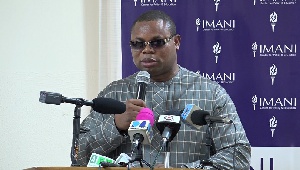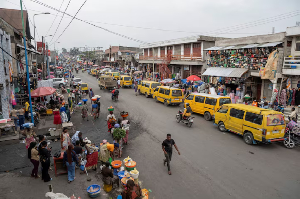Having obtained and filled the passport application form from ECOBANK, Spintex Road, I had to travel all the way through the heavy traffic to the passport office in the CBD for onward submission.
At the passport office, like in many other institutions in Ghana (Registrar General’s Department, DVLA etc.), I saw an overwhelming pool of people at the premises either waiting to collect their passports, submit further documents or submit a fresh application altogether.
Again I began asking myself so many questions that bother on the travel behaviours of this pool of people : how did they come , where did they come from, could they have done what they came to do using alternative means etc.
These were the questions that were going through my head as I was ushered into the gated premises of the passport office in Ridge. As I walked in, I saw even more people dotted around the corridors of the different rooms on the block. Each one of them had a story to tell about their frustrations they were going through to obtain a passport. One of the people who overheard me speaking Gonja walked up to me crying and telling me how he had been coming to the office every working day for close to five weeks chasing his passport.
It turned out (in the course of the day) that each of the offices/rooms had queues of at least 25 people either waiting to collect their passports or submit fresh applications. Beyond looking at issues from the Transport Planner’s perspective, I found the entire process repugnant and repulsive in that I thought to myself, why should anyone leave what he is doing to come and submit an application form when we have a postal system in place?
My exasperation at the process was worsened when I saw a whole DEPUTY DIRECTOR flicking through a pile of passports and handing them out to waiting clients.
I wondered why a whole a Deputy Director who ideally, should be attending meetings and strategizing on performance indicators, service level agreements and other matters as are necessary to clear backlogs should be sitting behind his desk (in a suit ) dishing out passports. In some of the places I have worked in in my working life, such jobs are for teenagers on ‘work experience’.
So for a whole Deputy Director to be doing that did not sit well with me and my cousin (who accompanied me) will tell you that I didn’t let him hear the end of it. Understandably, the office may have their own reasons for assigning that responsibility to a Deputy Director. For example, if passports have mysteriously gone ‘walkies’ in the past, it makes sense to put in place the extra measure to ensure that passports are delivered to their rightful owners.
Even then, I am tempted to argue that ‘dishing out’ passports is not an efficient use of the ‘resource’ in a director unless the title of a Director means nothing in this context.
Be it as it may, I went through the process of recording my biometric information and submitted my application. When I asked about how long it was going to take for the passport to be ready, nobody in the office could give me any definitive answer. The response was that I needed to “come back and check in a week’s time”. A week came and together with my cousin, we drove(emphasis, mine) to the office only to be told that my application had been ‘packed’ meaning the application was not processed as further documentation or information was needed from me.
Again, I was exasperated in that I thought the right thing to do under such circumstances (and from a Transport Planner’s perspective) was for someone to pick up the phone and call me to request the additional information needed rather than waiting for me to travel all the way from Spintex to the Central Business District of Accra (with its nauseating traffic) only to be told to go and get the information. That would have saved me having to sit in traffic and by extension that would have reduced traffic on the road by at least one car.
Furthermore, the information requested is of the type which could have been published on a website at least in the FAQs section so that whoever is making such applications knows that the application could not proceed without that information. Essentially, the point to note here is that there were several windows of opportunity for the passport office to help me and other applicants to avoid travelling.
The further and additional particulars that were requested by the passport office was a “Gazette”: an official journal or newspaper. To get the gazette, I needed to go to a Commissioner of Oath for a ‘Statutory Declaration’. This, I needed to take to the SUPREME COURT to get an ‘Attestation’.
Together with the attestation and the statutory declaration, I will then go to Ghana Publishing (apparently the only organisation responsible for this sort of thing with no branches anywhere else in Accra) to go and submit for the Gazetting. I needed to then wait for 2/3 weeks from the date of submission to ‘check’ if the Gazette is ready.
All these involved some form of travelling which, to all intents and purposes were unnecessary and avoidable and added to the traffic volumes in Accra. I honestly felt, and justifiably so, that most of the existing processes are unnecessary and rebarbative.
The truth is that if I have a name change, is it necessary for it to be published in an official journal which journal, not many people have access to and don’t read anyway? But this is the way things are done in Ghana (and like many things in Ghana) they’ve been like that since the beginning of times and no one cares to question the processes and their robustness towards doing what they are intended to do.
Anyway, after 3 weeks of waiting, the Gazette was ready which I picked up and submitted to the passport office. Going past the security guard to submit this document was in itself a Herculean task. To allow me in, a bespectacled-bully of a security guard made out like he was doing me a favour by allowing me into the premises of the office. But that was after he had wasted over 15 minutes of my time arguing over very trivial matters of a nonsensical nature.
As if the frustrations I went through in the hands of the security guard were not enough, I had to go through the experience of having to deal with two ladies who think they own the office they share with the Director. While I empathise with them over the ‘logistical’ limitations they face in the office (1 scanner, 1 not-very-fast computer, and 2 desks), I thought a veneer of customer services was just enough to bring smiles to the faces of the many frustrated-individuals waiting in the rather repugnant queues.
The two ladies belonged to two ends of a continuum: on the one end was a rather loud and rude lady who spoke to everyone who came to her desk as though they were imbeciles. She is responsible for recording one’s biometric information. I witnessed a very embarrassing argument between her and her colleague over an issue which I thought could have been handled more professionally (not in the full glare of waiting customers).
At the other end of the continuum was another lady who behaved as if she had literally been forced into sitting behind her desk and will not open her mouth to answer very basic common-sense questions.
But beyond the appalling standards of customer services, I thought there were deep-seated issues that bother on transport and people’s travel behaviours.
Generally, there is this misconception that the panacea to Accra’s traffic situation is to build more [road] infrastructure to accommodate increasing demand. This thinking, by no means exclusive to Ghanaians and known among transport planners as the ‘predict and provide’ ethos was at the very heart of the transport planning profession and dominated the field for a very long time (at least in the developed Global North) until evidence was adduced to the contrary that it is not enough to just expand capacity. For example, evidence from other contexts shows that building more highways only lead to an inefficient use of space – low density land use, city sprawl, pollution and traffic congestion.
With the field of transport planning and policy moving towards a more sustainable paradigm and given that most of the planning practices in developing contexts are already ‘sustainable’ in (some) sense of the word, it is quite an interesting paradox to note that we are not building on the existing (sustainable) systems we have.
I will give you a typical example of this: across the developing world, a significant proportion of the population use non-motorised modes of transport such as walking and cycling to engage in the normal activities of life. And yet, cycling and walking are not viewed as fundamental options and legitimate activities in discussions about public and private transport in Sub Saharan Africa.
The reasons can be pinned down to two main factors: one is that walking and cycling is seldom acknowledged by the planning authorities in sub-Saharan cities.
In other words (transport) planning authorities in Sub Saharan Africa are not up and doing when it comes to promoting walking and cycling as important modes of transport (a point articulated by Ghana’s Centre for Cycling Expertise). Secondly, in our context, the car is still seen as a symbol of status and other modes of transport (especially non-motorised modes), are still seen to be associated with the less-privileged.
To conclude, suffice it to say that there is a lot than can be done to help address the gnawing traffic problems in Accra and they don’t necessarily need to include building more road capacity. As a starting point, what will be nice to see is to see the Mayor of Accra (in a typical Borisian style) riding to his office rather than driving in his V8. What will be nice to see is our MPs jumping out of the luxury of their cars to walk down to the houses of parliament. And of course, what will be nice will be to see our President (with all the privileges open to him) follow the example of David Cameron to ride to work. That, I believe, will go a long way towards changing people’s perceptions about walking and cycling thereby helping reduce the levels of traffic on the streets of our cities.
Sheriff Idriss-Yahya
Institute for Transport Studies
University of Leeds, UK
Opinions of Sunday, 20 September 2015
Columnist: Idriss-Yahya, Sheriff















